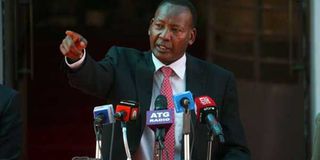Disciplinarian lost in between military and civilian worlds

Ministry of Interior and Coordination of National Government Cabinet Secretary Joseph Nkaissery addressing journalists at Harambee House in Nairobi on November 10, 2015. He has received training in some of the world’s leading military academies in India, the UK and the US. PHOTO | EVANS HABIL | NATION MEDIA GROUP
What you need to know:
- In March, he caused outrage when he said that journalists who had been severely beaten by GSU officers in Tana River County were to blame for the incident.
- Nkaissery left the military in 2001 after 29 years of service.
- Under his tenure, Mr Nkaissery came up with the draconian security laws that sought to roll back Kenyans’ freedom, including asking editors to seek police permission before publishing stories and pictures.
As a former Major-General, Internal Security Cabinet Secretary Joseph Nkaissery is probably used to being in the line of fire.
But no bullet proof vest could protect him when he came under a barrage of criticism on Tuesday for ordering the arrest of journalists, including Nation Parliamentary Editor John Ngirachu.
The journalist was picked up by police over a story highlighting payments of Sh3.8 billion in a day.
The CS accused the journalists of compromising national security.
But on Wednesday, he ate a humble pie and dropped his bid to force journalists to reveal their sources.
This is the second time Mr Nkaissery is in the media’s crosshairs.
In March, he caused outrage when he said that journalists who had been severely beaten by GSU officers in Tana River County were to blame for the incident.
Both incidents give a glimpse into the world of Mr Nkaissery; a tough man caught between his past, in which force was used to instil discipline and order, and the present, where the law must be respected. That need for order is seen even in his daily routine.
Nkaissery’s wife Hellen says he exercises at least 40 minutes a day, irrespective of wherever he is.
“There was a time we had alighted from a plane after an 18-hour journey and as I was looking for a place we could spend the night, he was looking for a place to exercise,” she said during an interview with Mediamax in July.
It is easy to find the genesis of the minister’s discipline.
Born on November 28, 1949, he joined the military in 1973 after a short stint at Kenyatta University College.
NATIONAL DUTY
He has received training in some of the world’s leading military academies in India, the UK and the US.
He holds a post-graduate diploma in Strategic Leadership and Management from the US Army War College.
Little was known about Mr Nkaissery’s exploits in the military until the Truth, Justice and Reconciliation Commission formed in 2003 handed in its report.
It accused him of leading disarmament that led to the deaths of civilians in what came to be known as “Lotiriri Massacre” in West Pokot.
“From February 22 to May 22, 1984, he spearheaded “Operation Nyundo” where many people lost their lives and over 20,000 animals starved. The operation was also punctuated with rape and beating of locals,” the report said.
In his defence, the CS said he was performing national duty but refused to appear before the commission which recommended that he be prosecuted.
Nkaissery left the military in 2001 after 29 years of service.
But the public would come to know his powerful connections to the administration of President Daniel arap Moi in 2002.
The Kanu regime spread its tentacles. A merger with Raila Odinga’s National Development Party, which was supposed to strengthen Kanu, had instead fermented rebellion.
When Moi chose Uhuru Kenyatta as Kanu’s flagbearer in the 2002 elections, Mr Odinga led a walkout to the Rainbow Alliance.
Among those who defected was Mr Moi’s long-suffering VP George Saitoti, who had been bypassed in the succession line.
When efforts to coerce Prof Saitoti to remain in Kanu failed, Mr Moi went for the VP’s lieutenants.
STRINGENT LAWS
Among them was Kajiado Central MP David Sankori.
And the man Kanu tasked to teach Mr Sankori a lesson was Mr Nkaissery who won the seat. Nkaissery, the soldier, had become a politician.
In the 2007 and 2013 elections, he was re-elected on the ODM ticket.
It is from ODM that President Kenyatta poached him to take charge of the Interior docket last year as Mr Joseph ole Lenku dithered at a time the country was under an onslaught of Al-Shabaab insurgents.
Probably because of the perception that Mr Lenku was weak in the face of the attacks, many Kenyans welcomed Mr Nkaissery, as his replacement.
Only a few voices pointed out to what they called his ‘‘undeveloped democratic values.’’
Under his tenure, Mr Nkaissery came up with the draconian security laws that sought to roll back Kenyans’ freedom, including asking editors to seek police permission before publishing stories and pictures.
Those who fell foul of the laws risked stiff fines and jail terms.
Of course, the courts rejected the laws.
A passionate debater on military matters, Mr Nkaissery’s latest brush with the media shows he has a lot to learn about the new dispensation.
‘‘He has either not read the Constitution, not understood it or has chosen to ignore it,’’ Constitution Implementation Commission Chairman Charles Nyachae said, following his attack on the media this week.
And for a man who wanted to quit politics in 2017, the battle to either build or destroy his legacy has just began.




